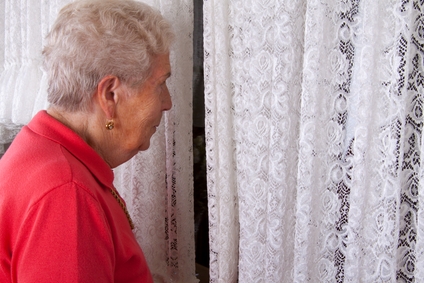How Mindfulness Meditation Reduces Loneliness

Loneliness is a widespread problem in Western society, especially among older adults, which doesn’t seem to get enough attention. As adults grow older, there is a tendency for them to become more isolated from their families and society in general.
A study published recently in a scientific journal found that mindfulness meditation helps older adults overcome loneliness. This is good news for seniors because loneliness is a major risk factor for various health conditions such as Alzheimer’s and cardiovascular disease.
Growing Old, and Lonely
Before we go on, it’s important to understand that loneliness is more of a feeling of social disconnection, rather than a physical isolation. There are various reasons why older adults can experience more loneliness. Here are just a few:
- Empty nest syndrome – Parents who have been busy caring for their children suddenly find themselves with much more free time after the kids leave the house.
- Rusty social skills – After so many years of being busy raising children, many parents have not been practicing their social skills with people their age.
- Set in our ways – Most of us know that we tend to become set in our ways as we get older. This means that we take fewer risks in trying new things, which is exactly what meeting new people is all about.
- Lack of social networks – In addition to having rusty social skills, parents have not been active developing their own social networks.
- Increase in children’s family responsibilities – As older adults reach retirement age, their children are often at the height of their careers and family responsibilities. So, they have less time for their aging parents.
To make matters worse, studies have shown that loneliness is contagious. Lonely people tend to spread loneliness by pushing other people away, instead of engaging them. This is probably because of the fear of rejection. Lonely people are generally more fearful, so meeting new people involves greater risk from their perspective.
Social Networking Programs Have Limited Success
Studies have shown that social networking programs for older adults have not been very effective. The reason is that they approach the problem from the outside, when loneliness is primarily an internal mental condition.
In addition, most social networking programs don’t help people develop core social skills such as deep listening, mindful speech, compassion, and forgiveness. They simply put people together in social settings and expect them to interact and develop meaningful relationships.
In order for social networking programs to be more effective, they would need to address both the internal and external factors that lead to loneliness. In other words, they would need to teach people social skills, and then help them develop their networks.
How Mindfulness Meditation Helps Overcome Loneliness
It is not surprising that the recent study by David Creswell, at Carnegie Mellon University, found that mindfulness meditation helps older adults overcome loneliness. This is because the practice addresses the main source of the problem—the human psyche. One thing that mindfulness meditation does is help us see our interconnectedness with the rest of humanity.
The main benefit of mindfulness meditation is that it helps people live in the present moment. This is particularly important to overcoming loneliness because the internal and external causes of loneliness take place in the present moment—that is, our emotions and interactions with other people.
The practice also helps them develop more effective social skills. For those who practice mindfulness meditation regularly, loneliness diminishes significantly because they can cultivate more intimate and meaningful relationships with people without fear of rejection. Practitioners learn to practice deep listening, mindful speech, compassion, forgiveness, and other relevant social skills.
In essence, mindfulness meditation addresses both the internal and external factors that lead to loneliness.
Living Rich and Fulfilling Lives
There are several health benefits from overcoming loneliness—both physical and psychological. The physical benefits include lower risk of Alzheimer’s and heart disease. Dr. Creswell’s study also indicated that people who practice mindfulness meditation may live longer.
Researchers measured the inflammatory response of the body, and found that those who meditated had a lower level of C-reactive protein (CRP), which is a marker commonly used in measuring inflammation. Elevated levels of CRP have been associated with higher risk of inflammatory disease and death. Listen to Dr. Creswell talk about his research findings. Video lasts about 6 minutes:
The greatest psychological benefit of overcoming loneliness is a greater sense of belonging. People who are not lonely live rich and fulfilling lives. Once their children leave the house and become preoccupied with their own lives, parents are able to develop their own social networks and enjoy their new lives without the daily pressures of raising children. In general, they are much happier.
From a societal perspective, we can also argue that mindfulness meditation will help reduce the strain on Medicare. If the practice can reduce loneliness and its related health consequences, then it can reduce the associated costs to the individuals on fixed incomes, the Medicare system, and the taxpayers.
Getting Started in Your Practice
Studies like the one cited above continue to confirm what many mindfulness meditation practitioners already suspected. We owe a debt of gratitude to researchers like Dr. Creswell and his team. Their studies are not only helping build the credibility of mindfulness meditation, but they are also helping achieve greater awareness of the practice and its benefits to all areas of our lives.
Now that we know that mindfulness meditation can help us overcome loneliness, it’s time to put that knowledge into practice. What I recommend to beginners is that they learn the basics of the practice and meditate for about 20 to 30 minutes daily. I also recommend about 10 minutes of daily writing meditation.
Though studies have not yet confirmed it, I suspect that writing meditation can have an even more immediate impact in overcoming loneliness than sitting meditation. I’ve seen people become more social and outgoing in just a matter of days. Now, imagine what you can achieve doing both.
If you need help with your meditation practice, I recommend the book Mindfulness Meditation Made Simple. It gives you detailed instructions on the 12 Steps of the Mindfulness Meditation Practice, and includes exercises for helping you become proficient with the meditation techniques.
If you enjoyed this article, sign up below for the Blooming Lotus Newsletter and we’ll notify you when the next article is released:





0 Comments